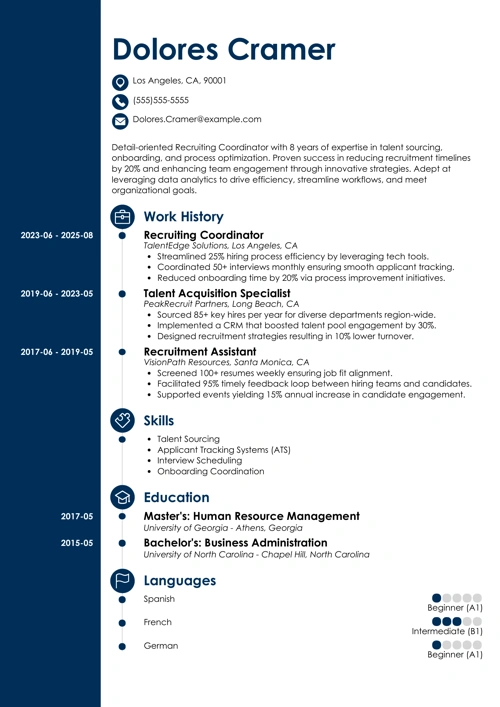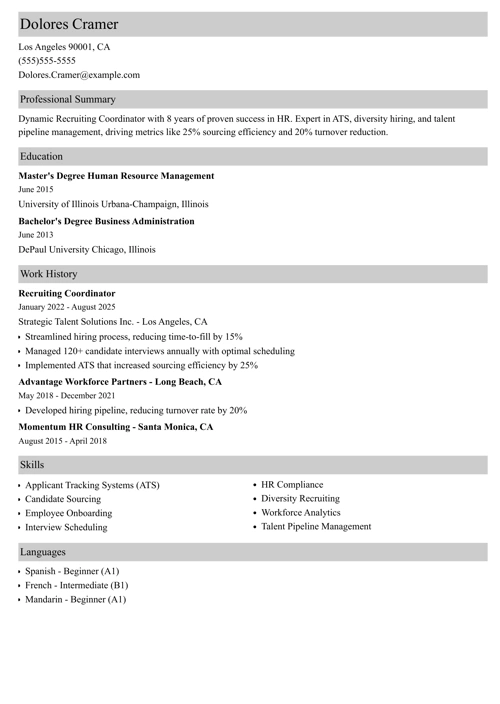You’ve worked in human resources and staffing for a while, you’re a seasoned expert. When it comes to coordinating recruitment efforts, your boss isn’t the boss, you’re the boss. Except—
The applications you send seem to fall flat. No calls, no interviews. It’s possible your resume-writing skills have fallen out of favor. No worries. Time to dust off the learner’s hat and create a picture-perfect recruiting coordinator resume!
This guide will show you:
- A recruiting coordinator resume example better than 9 out of 10 other resumes.
- How to write a recruiting coordinator resume that will land you more interviews.
- Tips and examples of how to put skills and achievements on a recruiting coordinator resume.
- How to describe your experience on a resume for recruiting coordinators to get any human resources job you want.
Want to save time and have your resume ready in 5 minutes? Try our AI resume builder. It’s fast and easy to use. Plus, you’ll get ready-made content to add with one click. See 20+ resume templates and create your resume here.
Sample resume made with our builder—See more resume examples here.
Check out our other related guides for more inspiration:
- HR Coordinator Resume Examples
- Human Resources Resume Examples
- HR Manager Resume Examples
- HR Assistant Resume Examples
- Recruiter Resume Examples
- Project Coordinator Resume Examples
- Office Manager Resume Examples
- General Manager Resume Examples
- Consulting Resume Examples
- Best Resume Samples for Any Profession
Recruiting Coordinator Resume Sample
Dolores Cramer
Recruiting Coordinator
248-270-9172
DoloresCCramer@teleworm.us
Linkedin.com/in/dolorescramer
Career Summary
Driven and detail-oriented HR professional with 8 years of experience. At SquaredCircle, increased employee retention by 45%, cutting company costs. Skilled at talent acquisition and thorough background checks. Seeking to join LevyNite to speed up hiring processes and boost employer branding scores on social media.
Work Experience
Recruiting Coordinator
SquaredCircle, Tucson, AZ
Jan 2012–Aug 2018
Key Qualifications and Responsibilities
- Managed the company’s social media recruitment efforts through sites like LinkedIn, Indeed, and Glassdoor.
- Provided administrative support to over 400 on- and off-site employees.
- Maintained a 100% flawless track record of employee trust.
- Increased employee retention by 45% through introducing more in-depth phone screening processes.
- Scheduled, at minimum, 30 monthly job interviews.
Key Achievement: Reevaluated company’s recruiting standards, replacing them with more efficient and contemporary methods to attract 50+ qualified professionals.
Senior Staffing Associate
Balanced Group, Salt Lake City, UT
Sept 2010–Jan 2012
Key Qualifications and Responsibilities
- Conducted background checks, assessments, and screenings for each candidate.
- Provided organizational support for managers, increasing workflow efficiency by 33%.
- Supported team members in implementing a college student internship program, which sealed the company’s employee shortage.
Education
Bachelor’s Degree in Business Administration
University of Toledo, Toledo, OH
2006–2010
Skills
- Talent Management
- Payroll Disbursement
- Headhunting
- Onboarding
- Screening & Background Checks
- Recruitee
- Active Listening
- Problem-Solving
- Teamwork Skills
- Communication Skills
Certifications
- Certified Professional – Human Resources (IPMA-CP)
- Human Resources Business Professional (HRBP)
Language Skills
- Spanish: working proficiency
- French: intermediate
You’ve seen the example, now it’s time for the real deal. This is how to write a recruiting coordinator resume:
1. Select the Best Format for a Recruiting Coordinator Resume
Recruiting coordinators assist in scouting, interviewing, hiring, and training new employees. They may also be heavily involved in onboarding, payroll disbursement, and other, more corporate-oriented tasks. A good recruiting coordinator resume should show excellent communication skills and attention to detail.
With all that said—
I’m sure you don’t pour over each detail on each resume that lands on your desks—and neither will other recruiters. So, you need to have a well-organized and easy-to-read resume that draws attention right off the bat.
Follow these resume formatting guidelines to get there:
- Add contact information to your resume using a modern, clear resume header.
- Then, think ahead about the way you will format your resume. For recruiting coordinators, the best option is the reverse chronological resume layout, which puts your most recent job front and center.
- Select a legible resume font like Calibri or Trebuchet. No need to get overly creative here!
- Leave plenty of white space between the individual sections of your resume. Remember to set the margins of your resume to 1 inch on all sides and line spacing to 1 or 1.15.
- And finally, a good idea is to save the resume as a PDF file. This ensures the recruiter will see your resume just as you intended it to look. The only exception is when the job ad asks specifically for a .doc file.
The place of a three-page-long resume is in a closet or a museum. So, how many pages should a resume be? For candidates with fewer than 10 years of experience, the answer is one. Resumes that are two pages long are reserved only for the most seasoned pros in senior positions, with tons of relevant achievements to share.
Read more: What Does a Great Resume Look Like? Examples and Step-by-Step Guide
2. Write a Recruiting Coordinator Resume Objective or Summary
A good resume manages to grab the attention of the reader right away and hold on tight from the top to the bottom of the page.
You started with the correct formatting, now it’s time to continue by writing a great resume intro section. It’s a short paragraph condensing your professional history and prospective future into a few sentences that also highlight the best about you.
There are two types of resume profiles to choose from:
- Resume career summaries highlight your experience and skills to demonstrate you’re the best candidate for the job. They focus on emphasizing quantifiable achievements that help back up your claims. Choose this option if you have experience in recruiting.
- If you’re a fresher, on the other hand, write a resume career objective. While also stressing your skills and knowledge, the focus here lies on the potential you have to be a great addition to the recruitment team. Use transferable resume skills and achievements to prove your worth.
Don’t beat yourself up if you can’t come up with a satisfying paragraph right away. You can always write this section last, and begin instead with, say, the work experience section.
Read more: How to Write the Perfect Resume Profile (with Examples)
3. Describe Your Experience on a Recruiting Coordinator Resume
Efficiency.
Let’s not beat around the bush—it’s brutal out there. If your resume isn’t efficient, meaning it isn’t utilizing the brief amount of time the recruiter has to look over it, you’re not getting the job.
A successful work experience section on a resume needs to score an 11/10 in efficiency, so boring descriptions won’t cut it.
- List your most recent job at the top, then the other ones after.
- Say for whom, where, and how long you worked for that company in each entry.
- Create a job description for each entry, focusing on your strengths and accomplishments. In 3–6 bullet points, describe your tasks, most important duties, and note-worthy professional achievements in recruitment. Each one should begin with an effective resume action word.
- The key is adding context through numbers to your accomplishments to make them tangible and quantifiable.
When describing past positions, you can tweak your professional title to fit the description of the job you’re applying for. If they want a Senior HR Coordinator—that’s who you are. Matching your resume to each job description like this is a golden ticket to an interview, use it every time!
Read more: How to Use Bullet Points on Your Resume: Guide to Effective Resume Bullet Points
4. Talk about Your Education on Your Recruiting Coordinator Resume
Whew, finally a bit of a breather!
But hang on, don’t scroll down just yet! Some people believe the education part of a resume is useless.
And these people are wrong, so don’t follow their advice. Although the majority of employers believe key skills are more important than your exact major, having a degree is still a requirement for those looking to work as recruiting coordinators.
It follows that your degree needs to make an appearance on your resume. If you’re an experienced recruitment professional, limit yourself to vital information: your degree, institution, and years of attendance.
However, if you’re short on professional experience, use your education section to your advantage. Here are some ideas on what you could include:
- Relevant coursework on a resume helps to hit all the right resume keywords, plus it shows you have the right theoretical knowledge.
- You can add your GPA to a resume (if it was 3.5 or higher) to show you’re a high-achiever and a fast learner. Similarly, Latin honors on a resume prove how ambitious you are.
- Listing club memberships and extracurricular activities on a resume can prove you’re a team player. Extra points if your extracurriculars are relevant to recruitment or business.
Read more: How to Put Your Degree on a Resume
5. Select the Right Skills on Your Recruiting Coordinator Resume
Did you know that 83% of recruiting professionals report some level of deficits in basic skills and/or knowledge among job applicants?
For you, as a recruiting pro, this means you should know exactly how to separate the wheat from the chaff based on the skills they claim on their application. If it’s full to the brim with guff, you know they’re probably faking it, or at the very least being dishonest.
Don’t let that be you. That’s the dumb way.
The smart way to go about adding skills to your resume is by cross-referencing your hard skills, soft skills, and all other job skills you can think of with the job posting itself. The wording there isn’t random.
HR reps create the ads with specific keywords they have in mind to sync up with the Applicant Tracking Systems.
For example, if they’re looking for a “communicative, well-mannered recruiting coordinator skilled inpayroll administration”, you put communication skills, interpersonal skills, and payroll disbursement onto your resume.
Here’s a sample list of skills to get a few ideas if you’re still hazy on the deets:
Recruiting Coordinator Resume Skills
- Talent Management
- Payroll Disbursement
- Headhunting
- Onboarding
- Screening & Background Checks
- Marketing Skills
- Social Media
- Ethics
- Emotional Intelligence
- Compassion
- HR Software
- Recruitee
- Google Suite
- Microsoft Office Skills
- Recruiting
- Active Listening
- Problem Solving
- Teamwork Skills
- Communication Skills
- Interpersonal Skills
- Health & Safety
- Multitasking Skills
- Employee Evaluation
Read more: Top Skills Employers Look for In Job Candidates
Making a resume with our builder is incredibly simple. Follow our step-by-step guide, use ready-made content tailored to your job and have a resume ready in minutes.
When you’re done, our AI resume builder will score your resume and our resume checker will show you exactly how to improve it.
6. Get Creative with Extra Sections
Remember how I said a good resume grabs the reader’s attention from start to finish?
Well, the several hundred other applicants also did that.
But they don’t know the secret to a great resume—standing out.
Think about it: you wouldn’t want to work with the guy whose whole personality occupies the surface area of his 22” monitor.
The resume you create needs to prove you’re more than the sum of your skills, so add some of these sections to show off your unique side:
- Language skills
- Volunteer work
- Hobbies and interests
- Certifications and licenses
- Memberships in relevant associations
Read more: Best Tips for Writing a Resume
7. Include a Recruiting Coordinator Cover Letter
This one you should be well familiar with.
Cover letters notoriously stir up heated debates in the HR industry, mainly concerning the very sense of their existence. Are cover letters really necessary in this day and age?
Turns out they are. As our HR statistics show, nearly half of all recruiters expect candidates to attach one with their job application. So there, debate settled.
Here are the basics of an HR-pleasing cover letter:
- Proper cover letter formatting with plenty of whitespace and 1-inch margins are the key ingredients.
- Don’t be intimidated to address the recruiter by name in your cover letter. When it’s all over, you’re going to be work colleagues anyway. Well, that’s not the real reason, it’s more to avoid writing “To Whom It May Concern” at the top.
- Open the cover letter on one or two of your greatest achievements to—once again—securely grab their attention.
- Continue by emphasizing your excitement about the opportunity, the things you find great about the company, and what makes you and them a perfect match.
- End the cover letter by boldly claiming you know how to explode their business, but play your cards close to the chest—and cheekily say you’ll tell them only in person.
Read more: How to Write a Job-Winning Cover Letter
Plus, a great cover letter that matches your resume will give you an advantage over other candidates. You can write it in our cover letter builder here. Here's what it may look like:
See more cover letter templates and start writing.
That’s it!
You’ve successfully coordinated your way to an awesome resume!
About Zety’s Editorial Process
This article has been reviewed by our editorial team to make sure it follows Zety's editorial guidelines. We’re committed to sharing our expertise and giving you trustworthy career advice tailored to your needs. High-quality content is what brings over 40 million readers to our site every year. But we don't stop there. Our team conducts original research to understand the job market better, and we pride ourselves on being quoted by top universities and prime media outlets from around the world.





